Eco-Friendly Ganpati Step by Step Guide - Ganesh Chaturthi Special
Ganesh Chaturthi is one of the most loved and vibrant festivals in India, celebrating the birth of Lord Ganesha — the god of wisdom, prosperity, and good fortune. Traditionally, beautifully crafted Ganpati idols are brought home or placed in public pandals, worshipped for days, and then immersed in water (visarjan).
However, in recent years, many Ganpati idols are made from Plaster of Paris (PoP) and painted with chemical-based colors. These materials do not dissolve easily in water and release harmful toxins, polluting rivers, lakes, and oceans, and endangering aquatic life.
The good news? You can make your own eco-friendly Ganpati idol at home using natural, biodegradable materials. Not only will you help the environment, but you’ll also add a personal touch to the festival and involve your family in a beautiful, creative activity.

Why Choose an Eco-Friendly Ganpati Idol?
Before we get into the tutorial, let’s understand why it matters:
Protects Water Bodies – Clay, paper pulp, and natural colors dissolve easily in water without releasing harmful chemicals.
Safe for Aquatic Life – No toxic paints or synthetic glues to harm fish and plants.
Encourages Sustainable Living – A small but impactful step towards greener celebrations.
Budget-Friendly – Making your own idol at home costs far less than buying from the market.
Emotional Value – An idol made with your own hands holds deeper sentimental meaning.
Materials You’ll Need
Here’s a list of eco-friendly materials you can use. You don’t need all of them — choose what’s available and suitable for your design.
Base Material (Choose One)
Natural clay (Shadu clay) – Traditional, soft, and easy to mold.
Paper pulp – Recycled newspapers soaked in water and blended.
Flour dough (atta dough) – Best for smaller idols.
Coconut husk and coir – For rustic texture.
Turmeric mixed with flour – For natural yellow idols.
Colors & Decoration
Haldi (turmeric) – Yellow
Kumkum – Red
Multani mitti (Fuller’s earth) – Beige/brown
Neem leaves paste – Green
Beetroot juice – Pink
Coffee powder or cocoa – Brown
Tools
A flat surface or a wooden board
Small sculpting tools / butter knife / toothpicks
A bowl of water for smoothing clay
Old newspapers or cloth for workspace
Brushes for natural paints
Step-by-Step Guide to Making Your Eco-Friendly Ganpati
We’ll use natural clay in this tutorial since it’s beginner-friendly and dissolves easily during visarjan.

Step 1: Prepare Your Workspace
Spread an old cloth or newspaper on your table. Keep all materials within easy reach. This will keep things clean and organized.

Step 2: Knead the Clay
Take the clay and knead it well with water until it becomes soft, pliable, and lump-free. This step is like kneading dough — the smoother the clay, the better the final idol.
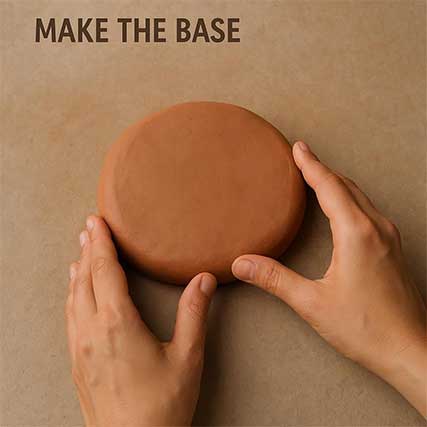
Step 3: Make the Base
Roll a large ball of clay and flatten it slightly to form a stable base for your idol. This ensures the idol stands firmly.
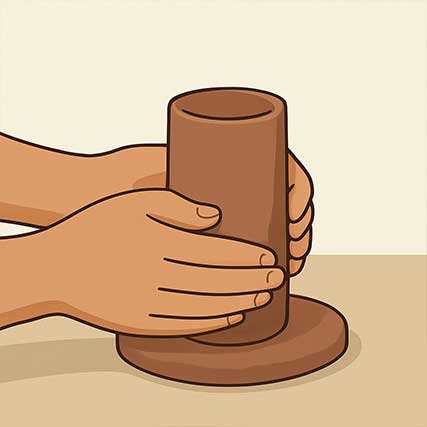
Step 4: Shape the Body
Roll another large piece of clay into a cylinder for the body.
Place it upright on the base and smooth the edges.
Ensure it’s proportionate — Ganpati idols usually have a large belly (symbolizing prosperity).
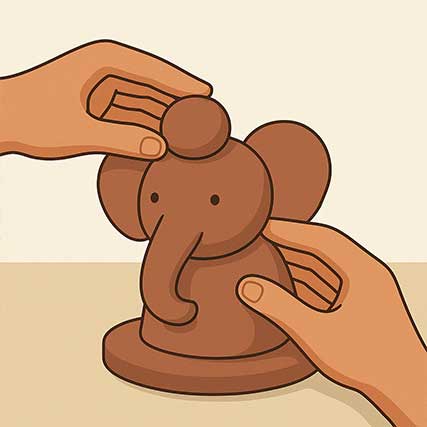
Step 5: Create the Head and Trunk
Roll a smaller ball for the head and attach it on top of the body.
For the trunk, make a sausage-like shape and curve it gently to one side.
Blend the edges with wet fingers so the parts don’t separate.
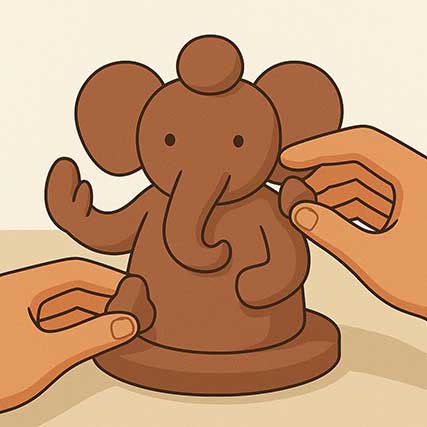
Step 6: Add Ears and Hands
Shape two large fan-like ears and attach them to the head.
Make four small cylinders for arms and position them according to traditional poses — one holding a modak, one in blessing position, and the others holding symbolic items like a lotus or conch.
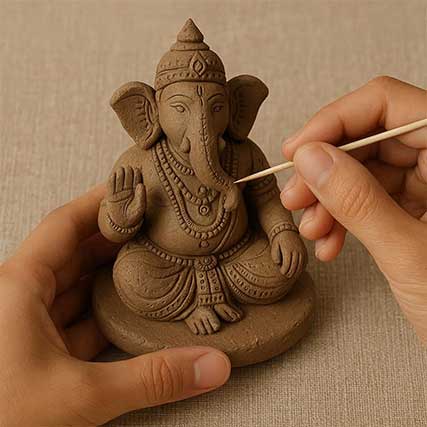
Step 7: Add Details
Use a toothpick to etch eyes, jewelry, and clothing patterns.
If you’re making a crown, roll a small cone and fix it on top of the head.
Keep all details minimal to retain the eco-friendly approach.
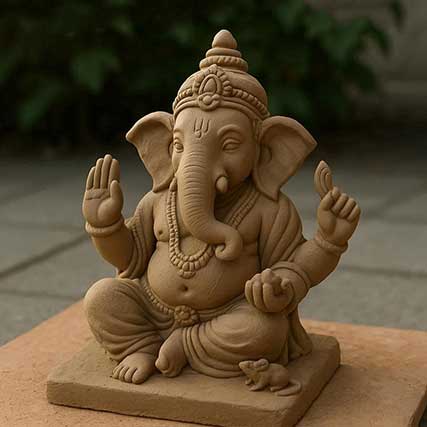
Step 8: Dry the Idol
Let your idol air-dry in a shaded area for 24–48 hours. Avoid direct sunlight as it may crack the clay.
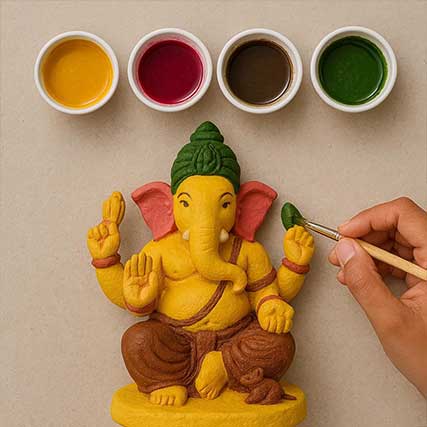
Step 9: Apply Natural Colors
Once dry, paint your idol using natural dyes. You can use:
Turmeric for yellow
Beetroot juice for pink
Coffee powder mixed with water for brown
Neem paste for green
Mix the colors with a little water and apply with a brush.

Step 10: Decoration
You can decorate with:
Fresh flowers
Fabric scraps for clothes
Paper crowns
Small handmade garlands from marigold or mango leaves
Tips for a Perfect Eco-Friendly Ganpati
Keep it simple — avoid plastic, glitter, or thermocol.
If using paper pulp, add a little flour paste to bind the pulp together.
For visarjan, immerse the idol in a bucket or tub at home and use the water for plants.
Involve children in making the idol — it’s a great eco-awareness activity.
Eco-Friendly Visarjan (Immersion)
Instead of immersing in rivers or lakes, you can:
Place the idol in a large bucket at home.
Let it dissolve naturally (takes a few hours for clay).
Use the clay water for gardening — symbolic of returning to the earth.
Benefits of Home-Made Eco-Friendly Ganpati
Reduces pollution significantly.
Inspires friends and family to follow sustainable practices.
Promotes Indian handicraft traditions.
Increases creativity and bonding during the festival.
Conclusion
Making your own eco-friendly Ganpati idol at home is more than just a craft activity — it’s a spiritual and environmental responsibility. You are not only honoring Lord Ganesha but also showing respect to Mother Earth. This small change, if adopted widely, can make our festivals cleaner, greener, and more meaningful.
So this year, gather your family, roll up your sleeves, and create a Ganpati idol with your own hands. Trust me, the joy you’ll feel will be unmatched — and so will the blessings. 🌱🙏

